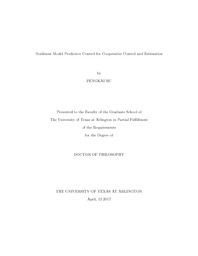
ATTENTION: The works hosted here are being migrated to a new repository that will consolidate resources, improve discoverability, and better show UTA's research impact on the global community. We will update authors as the migration progresses. Please see MavMatrix for more information.
Show simple item record
| dc.contributor.advisor | Subbarao, Kamesh | |
| dc.creator | Ru, Pengkai | |
| dc.date.accessioned | 2017-07-03T16:00:53Z | |
| dc.date.available | 2017-07-03T16:00:53Z | |
| dc.date.created | 2017-05 | |
| dc.date.issued | 2017-06-08 | |
| dc.date.submitted | May 2017 | |
| dc.identifier.uri | http://hdl.handle.net/10106/26837 | |
| dc.description.abstract | Recent advances in computational power have made it possible to do expensive online computations for control systems. It is becoming more realistic to perform computationally intensive optimization schemes online on systems that are not intrinsically stable and/or have very small time constants. Being one of the most important optimization based control approaches, model predictive control (MPC) has attracted a lot of interest from the research community due to its natural ability to incorporate constraints into its control formulation.
Linear MPC has been well researched and its stability can be guaranteed in the majority of its application scenarios. However, one issue that still remains with linear MPC is that it completely ignores the system's inherent nonlinearities thus giving a sub-optimal solution. On the other hand, if achievable, nonlinear MPC, would naturally yield a globally optimal solution and take into account all the innate nonlinear characteristics. While an exact solution to a nonlinear MPC problem remains extremely computationally intensive, if not impossible, one might wonder if there is a middle ground between the two. We tried to strike a balance in this dissertation by employing a state representation technique, namely, the state dependent coefficient (SDC) representation. This new technique would render an improved performance in terms of optimality compared to linear MPC while still keeping the problem tractable. In fact, the computational power required is bounded only by a constant factor of the completely linearized MPC.
The purpose of this research is to provide a theoretical framework for the design of a specific kind of nonlinear MPC controller and its extension into a general cooperative scheme. The controller is designed and implemented on quadcopter systems. | |
| dc.format.mimetype | application/pdf | |
| dc.language.iso | en_US | |
| dc.subject | MPC | |
| dc.subject | SDC | |
| dc.subject | Quadcopter | |
| dc.title | Nonlinear Model Predictive Control for Cooperative Control and Estimation | |
| dc.type | Thesis | |
| dc.degree.department | Mechanical and Aerospace Engineering | |
| dc.degree.name | Doctor of Philosophy in Aerospace Engineering | |
| dc.date.updated | 2017-07-03T16:01:57Z | |
| thesis.degree.department | Mechanical and Aerospace Engineering | |
| thesis.degree.grantor | The University of Texas at Arlington | |
| thesis.degree.level | Doctoral | |
| thesis.degree.name | Doctor of Philosophy in Aerospace Engineering | |
| dc.type.material | text | |
Files in this item
- Name:
- RU-DISSERTATION-2017.pdf
- Size:
- 2.496Mb
- Format:
- PDF
This item appears in the following Collection(s)
Show simple item record


